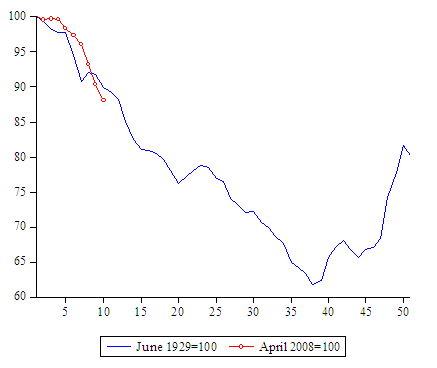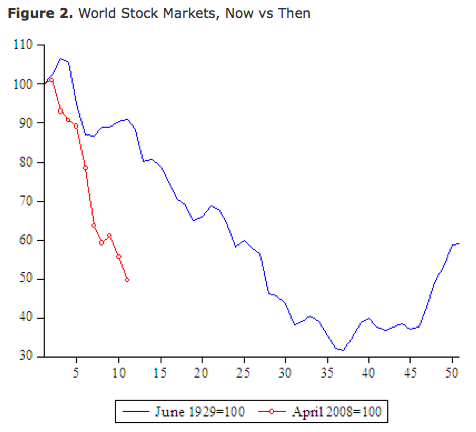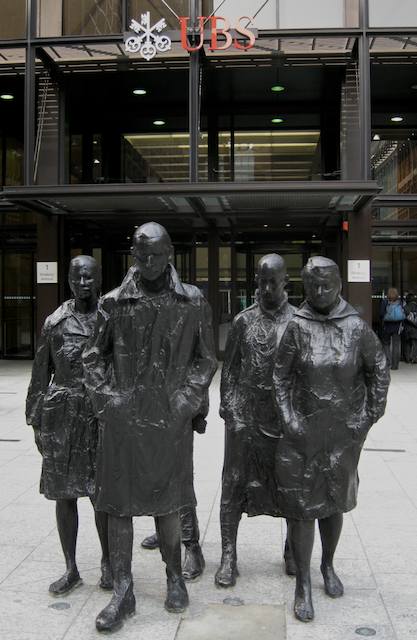… in 1973, Picasso died at his home near Mougins at age the ripe old age of 91.
Video reveals police attack on man who died at G20 protest
Amazing footage showing what appears to be an outrageous, aggressive unprovoked attack by a police officer.
Ian Tomlinson, the man who died at last week’s G20 protests in London, was attacked from behind and thrown to the ground by a baton-wielding police officer in riot gear, dramatic footage obtained by the Guardian shows.
Even if it cannot be shown that Mr Tomlinson’s death was directly caused by this attack, it looks like GBH to me. It’ll be interesting to see how the Met/City of London Police try to avoid responsibility.
Interesting case also of citizen journalism?
LATER: Interesting blog post linking the Tomlinson case to that of Blair Peach who was killed just 30 years allegedly by a blow from one of the Yard’s ‘Special Patrol Group’.
In Peach’s day there were no hand-sized video cameras available to record the action. Today, media is much more immediate and many people carry camera phones capable of recording video. This means that any untoward action by the police during the G20 action was very likely to arrive in the public domain, just as the Guardian’s video showing the assault on Tomlinson has.
This begs the question of why the police were acting in such an aggressive and violent manner when they knew full well their actions were likely to be captured on film and beamed worldwide? The answer, to me, is simple: The police have too many bad apples in their barrels, people who are not in the job to protect people but actually prefer to bully them. They especially like to bully people who they see as ‘not one of them’. In other words, people who don’t share their often extreme views. This is a dangerous situation. It is especially so because the police force has been given many extra powers under the guise of ‘the war on terror’. Now, we are seeing them using these powers to terrorise.
I’m sorry to be a cynic but I do not believe that the policeman who was involved in Ian Tomlinson’s death will ever be brought to justice. Nor will the police aggression be reigned in as there seems to be absolutely zero political will in the leading parliamentary parties to bring their hunting dogs to heel.
Footnote: The Coroner’s verdict on Peach was “death by misadventure”.
Interesting uses for YouTube #5,367
As always with these things, you have to wait for the punchline.
Thanks to Dave Winer for the link.
How are we doing?
We ain’t seen nothing yet, if this analysis by a former IMF economic adviser and a TCD economics professor is to be believed.
The Great Depression was a global phenomenon. Even if it originated, in some sense, in the US, it was transmitted internationally by trade flows, capital flows and commodity prices. That said, different countries were affected differently. The US is not representative of their experiences.
Our Great Recession is every bit as global, earlier hopes for decoupling in Asia and Europe notwithstanding. Increasingly there is awareness that events have taken an even uglier turn outside the US, with even larger falls in manufacturing production, exports and equity prices.
In fact, when we look globally, as in Figure 1, the decline in industrial production in the last nine months has been at least as severe as in the nine months following the 1929 peak. (All graphs in this column track behaviour after the peaks in world industrial production, which occurred in June 1929 and April 2008.) Here, then, is a first illustration of how the global picture provides a very different and, indeed, more disturbing perspective than the US case considered by Krugman, which as noted earlier shows a smaller decline in manufacturing production now than then.
The historical comparison with stock markets is also interesting:
The wisdom of crowds?
From Gawker.
If you apply for expensive training in a dying profession, why should anyone trust your abilities to collect and analyze information?
Newspapers are closing and laying people off; magazines are firing people left and right; even online publishers are gloomy. So naturally writers are flocking to journalism schools: Enrollment is up 38 percent, 20 percent and 6 percent at Columbia, Stanford and NYU, respectively, Forbes.com reports.
The average annual cost to attend is $31,000. The average journalist with a graduate degree earned $40,000 per year — before the financial meltdown began in the fall…
Walking away from responsibility
Broadgate, City of London, Monday. Flickr version here.
Seeing all the angles
In the Bloomberg Gallery, Finsbury Square. Flickr version here.
“Misappropriation” vs. Fair Use
The legal basis for a challenge by newspapers to Google is beginning to emerge.
In 1918, the AP was involved in a case called International News Service v. Associated Press. Like current competitor All Headline, INS didn’t actually copy AP’artime scoops off the wire, have a hired hack rewrite the story in his own words, and put out their own version of the breaking news without having to bear all the overhead (not to mention the considerable risk) of sending trained reporters to a war zone. It wasn’t quite copyright infringement, but it sufficiently offended the justices’ sense of fair play that they developed the doctrine of ‘misappropriation’ to cover the immediate copying and dissemination of ‘hot news’ by commercial competitors of a news organization. If such ‘free riding’ were allowed, the judges reasoned, the parasites would always be able to undersell their hosts, to the detriment of journalism in the long run.
It’s not hard to see why AP is concerned now. According to its annual report (PDF), the combination of subscriber attrition and the lower fees they’ve had to adopt to keep that dwindling, cash-strapped client base on board “will result in a revenue decline not seen by the company since the Great Depression.”
The Internet compounds the problem. The RIAA and MPAA can at least try—however ineffectively—to use copyright law to stanch unauthorized copying of their works. But what AP is selling isn’t really the scintillating prose of its writers: it’s fast access to the facts of breaking news. Now, though, a writer for any one of a million websites can read an AP story on the site of a subscribing news organization, write up their own paraphrase of the story, and have it posted—and drawing eyeballs from AP subscribers — within an hour of the original’s going live.
This might just work for AP. It’ll be harder for newspapers to argue, however — except for straight news coverage. I’d be surprised if they could make the argument stick for commentary — which, after all, is what most newspapers do nowadays.
Forty years on
Today is the 40th anniversary of the first Request For Comment (RFC) — the form devised by the ARPANET’s designers for discussing technical issues. Steve Crocker — who as a graduate student invented the idea — has written a lovely piece about it in the New York Times:
A great deal of deliberation and planning had gone into the network’s underlying technology, but no one had given a lot of thought to what we would actually do with it. So, in August 1968, a handful of graduate students and staff members from the four sites began meeting intermittently, in person, to try to figure it out. (I was lucky enough to be one of the U.C.L.A. students included in these wide-ranging discussions.) It wasn’t until the next spring that we realized we should start writing down our thoughts. We thought maybe we’d put together a few temporary, informal memos on network protocols, the rules by which computers exchange information. I offered to organize our early notes.
What was supposed to be a simple chore turned out to be a nerve-racking project. Our intent was only to encourage others to chime in, but I worried we might sound as though we were making official decisions or asserting authority. In my mind, I was inciting the wrath of some prestigious professor at some phantom East Coast establishment. I was actually losing sleep over the whole thing, and when I finally tackled my first memo, which dealt with basic communication between two computers, it was in the wee hours of the morning. I had to work in a bathroom so as not to disturb the friends I was staying with, who were all asleep.
Still fearful of sounding presumptuous, I labeled the note a “Request for Comments.” R.F.C. 1, written 40 years ago today, left many questions unanswered, and soon became obsolete. But the R.F.C.’s themselves took root and flourished. They became the formal method of publishing Internet protocol standards, and today there are more than 5,000, all readily available online.
But we started writing these notes before we had e-mail, or even before the network was really working, so we wrote our visions for the future on paper and sent them around via the postal service. We’d mail each research group one printout and they’d have to photocopy more themselves.
The early R.F.C.’s ranged from grand visions to mundane details, although the latter quickly became the most common. Less important than the content of those first documents was that they were available free of charge and anyone could write one. Instead of authority-based decision-making, we relied on a process we called “rough consensus and running code.” Everyone was welcome to propose ideas, and if enough people liked it and used it, the design became a standard…
The RFC archive is here.
Relationship Symmetry in Social Networks
Interesting analysis by Joshua Porter of the difference between Twitter and FaceBook.
In general, there are two ways to model human relationships in software. An “asymmetric” model is how Twitter currently works. You can “follow” someone else without them following you back. It’s a one-way relationship that may or may not be mutual.
Relationship Symmetry in the Facebook model
Facebook, on the other hand, has always used a “symmetric” model, where each time you add someone as a friend they have to add you as a friend as well. This is a two-way relationship, and it is required to have any relationship at all. So as a Facebook user there is always a 1-1 relationship among your friends. Everyone who you have claimed as a friend has also claimed you as a friend.
The post goes on to cite Andrew Chen’s point that Twitter allows 4 types of relationships, while Facebook only allows for two. The two relationships of Facebook are “friend and Not Friend”. The four relationships of Twitter are:
1. People who follow you, but you don’t follow back
2. People who don’t follow you, but you follow them
3. You both follow each other (Friends!)
4. Neither of you follow each other
As Andrew points out, an asymmetric model allows for more types of relationships. I think the benefits go further than that. I think that the asymmetric model better mimics how real attention works…and how it has always worked.




